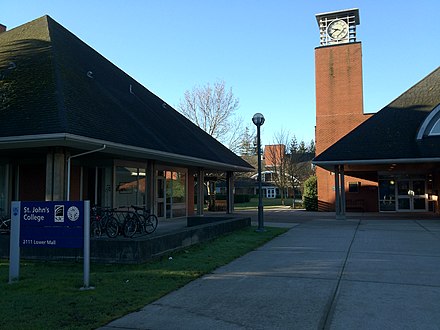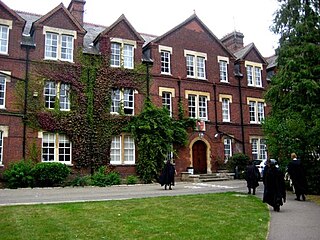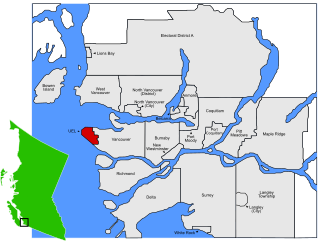Coordinates: 49°15′46″N123°15′25″W / 49.26266°N 123.256833°W

A geographic coordinate system is a coordinate system that enables every location on Earth to be specified by a set of numbers, letters or symbols. The coordinates are often chosen such that one of the numbers represents a vertical position and two or three of the numbers represent a horizontal position; alternatively, a geographic position may be expressed in a combined three-dimensional Cartesian vector. A common choice of coordinates is latitude, longitude and elevation. To specify a location on a plane requires a map projection.
Contents
- Activities
- Academic Lectures and Interdisciplinary Groups
- Social and Community Activities
- Location and Facilities
- Organization
- History
- Notable alumni
- References
- External links
| Motto | "Light and Truth" |
|---|---|
| Type | Centre for advanced interdisciplinary scholarship at the University of British Columbia |
| Established | 1997 |
| Principal | Dr. Henry Yu 余全毅 |
| Postgraduates | 150 graduate students, 12 postdoctoral scholars |
| Location | |
| Campus | Urban, overlooking the ocean and mountains |
| Affiliations | Green College, Massey College, University of British Columbia, Cambridge University |
| Website | www |
| St. John's College, University of British Columbia | |||||||
| Traditional Chinese | 聖約翰學院 | ||||||
|---|---|---|---|---|---|---|---|
| Simplified Chinese | 圣约翰学院 | ||||||
| |||||||
St. John's College is one of two residential colleges at the University of British Columbia which are modeled on the Oxbridge collegiate system, the other being Green College. It provides a community for graduate students and postdoctoral researchers, with an international focus. St. John's College maintains close ties with Green College and the University of Cambridge in the United Kingdom.
A residential college is a division of a university that places academic activity in a community setting of students and faculty, usually at a residence and with shared meals, the college having a degree of autonomy and a federated relationship with the overall university. The term residential college is also used to describe a variety of other patterns, ranging from a dormitory with some academic programming, to continuing education programs for adults lasting a few days. In some parts of the world it simply refers to any organized on-campus housing, an example being University of Malaya.

The University of British Columbia (UBC) is a public research university with campuses in Vancouver and Kelowna, British Columbia. Established in 1908, UBC is British Columbia's oldest university. The university is ranked among the top 20 public universities worldwide and among the top three in Canada. With an annual research budget of $600 million, UBC funds over 8,000 projects a year.

Oxbridge is a portmanteau of Oxford and Cambridge, the two oldest, most prestigious, and highly-ranked universities in the United Kingdom. The term is used to refer to them collectively, in contrast to other British universities, and more broadly to describe characteristics reminiscent of them, often with implications of superior social or intellectual status or elitism.
The college consists of a residential community of 160 graduate students, postdoctoral researchers, visiting scholars and professors, and non-resident affiliated faculty and academic programming. The College is located at the West end of the UBC campus, near Wreck Beach. Aside from taking up residence at St. John's, residential membership entails active involvement in the social and academic aspects of College life. Involvement takes the form of participation on various social and academic committees, and attendance at functions and lectures sponsored by or otherwise linked with the College. Dining together is an integral part of the St. John's College experience. The college is home to the Dining Society which provides meals five days a week to residents and guests.
A postdoctoral researcher or postdoc is a person professionally conducting research after the completion of their doctoral studies. The ultimate goal of a postdoctoral research position is to pursue additional research, training, or teaching in order to have better skills to pursue a career in academia, research, or any other fields. Postdocs often, but not always, have a temporary academic appointment, sometimes in preparation for an academic faculty position. They continue their studies or carry out research and further increase expertise in a specialist subject, including integrating a team and acquiring novel skills and research methods. Postdoctoral research is often considered essential while advancing the scholarly mission of the host institution; it is expected to produce relevant publications in peer-reviewed academic journals or conferences. In some countries, postdoctoral research may lead to further formal qualifications or certification, while in other countries it does not.

Wreck Beach is a clothing-optional beach located in Pacific Spirit Regional Park, which is in turn part of the University Endowment Lands just west of Vancouver, British Columbia, Canada. The clothing-optional section is clearly marked with signs and stretches approximately 6.7 kilometres or 4.2 miles from Acadia Beach, in the north, to the Booming Grounds Creek on the north arm of the Fraser River. The park is administered by the Greater Vancouver Regional District (GVRD), though aboriginal claims are repeatedly asserted, especially by the Musqueam.



















